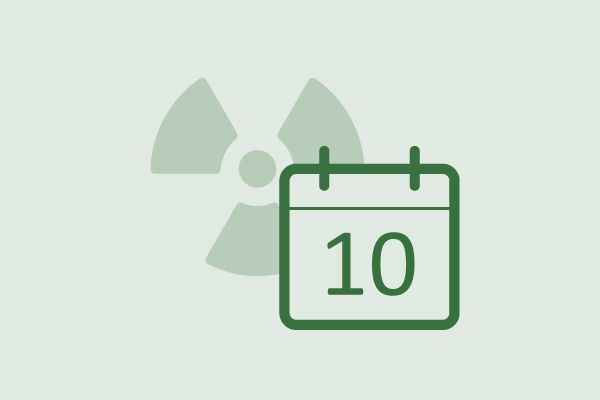10 years of Fukushima

Nuclear safety after the disaster
On March 11, 2011, a severe earthquake and subsequent tsunami struck east of Japan. This tsunami also flooded the Fukushima Dai-ichi and Fukushima Da-ini nuclear power plants, and it soon became clear that a serious nuclear accident had occurred, at least at the Fukushima Dai-ichi nuclear power plant. This reactor accident had significant repercussions for the nuclear safety of nuclear power plants worldwide, but especially in Europe.
Europe responded – with Austria's significant initiative and contribution – with stress tests for nuclear power plants. Robustness against severe natural disasters and the ability to manage the impacts of severe natural disasters have certainly improved, but even today, 10 years later, the national action plans have not yet been fully implemented.
In March 2011, the European Council of Heads of State and Government also called for consideration of how to promote nuclear safety in the countries neighboring the European Union (EU). Since then, the European Commission and the High-Level Expert Group on Nuclear Safety and Waste Management (ENSREG) have been working to encourage third countries in the EU's neighborhood to conduct stress tests. Switzerland and Ukraine participated from the outset, followed later by Taiwan, Armenia, Belarus, and Turkey. In addition, there is a dedicated EU external assistance instrument that, among other things, provides financial support for the establishment of regulatory authorities and the conduct of stress tests, including the implementation of national action plans.
A conference of ministers convened by the Director General of the International Atomic Energy Agency (IAEA) in June 2011 called on all nuclear power plant operators worldwide to conduct stress tests. This call was met in many cases, although not to the extent of the European stress tests.
Europe subsequently revised and tightened its legal framework. With the current Nuclear Safety Directive, the European Union has a legally enshrined obligation to upgrade nuclear weapons, non-compliance with which can lead to infringement proceedings and ultimately sanctions. At the international level, however, the Convention on Nuclear Safety remained an interpretation of the existing agreement, as concrete proposals for amendments failed to gain the necessary support.
The Nuclear Energy Agency (NEA) of the Organisation for Economic Co-operation and Development (OECD) also held an informal ministerial meeting on the topic in June 2011, together with France (as the then G20/G8 chair, the group of the most powerful industrialized nations). Various proposals – for example, by Australia to make international review mandatory for accidents of a certain severity, or by Belgium and Switzerland to make international review missions by the NEA and the IAEA mandatory – remained unrealized, as did a significant strengthening of the role of international organizations in the field of nuclear safety.
Even if activities at the European and international levels have not kept pace with the initial announcements, they have certainly contributed to improving nuclear safety within Europe and beyond. On the other hand, the European power plant fleet has aged another 10 years. And serious accidents in nuclear power plants cannot be ruled out. This is one of the reasons why Austria does not consider nuclear energy a suitable means of climate protection. Further reasons are discussed in detail in the fact sheets.
Fact Sheets
The following fact sheets are also available in German!
- Fact Check new: Triple Pledge, Empty Promise? (PDF, 337 KB)
- Fact Check: Nuclear Power’s Share in Electricity Generation Continues to Fall (PDF, 149 KB)
- Fact Check: The Triumph of Renewable Energies (PDF, 205 KB)
- Fact Check: No Signs of a Nuclear Renaissance (PDF, 288 KB)
- Fact Check: New Nuclear Power and the Climate Emergency (PDF, 179 KB)
- Fact Check new: Nuclear Power and War (PDF, 114 KB)
- Fact Check: Nuclear Terrorism: “Most Immediate and Extreme Threat to Global Security” (PDF, 111 KB)
- Fact Check: The Power Plant and the Bomb – Nuclear Energy’s Siamese Twins (PDF, 116 KB)
- Fact Check new: Can nuclear power deliver security of supply and energy independence? (PDF, 127 KB)
- Fact Check new: Potential Nuclear Newcomer Countries (PDF, 120 KB)
- Fact Check: Small Modular Reactors – The Power of Promise (PDF, 137 KB)
- Fact Check new: Generation IV reactors (PDF, 104 KB)
- Fact Check: Renewables More Reliable Than Ageing Nuclear Power Plants? (PDF, 357 KB)
- Fact Check: Safety Implications of Lifetime Extensions (PDF, 261 KB)
- Fact Check: Cost Implications of Lifetime Extensions (PDF, 165 KB)
- Fact Check: Nuclear and Coal Phaseout – Can It Be Done? – The German Case (PDF, 144 KB)
- Fact Check new: Nuclear Economics and Finance (PDF, 258 KB)
- Fact Check: Nuclear Waste – An Intergenerational Issue (PDF, 105 KB)
- Fact Check: Fukushima – Not a Worst-Case Even (PDF, 248 KB)